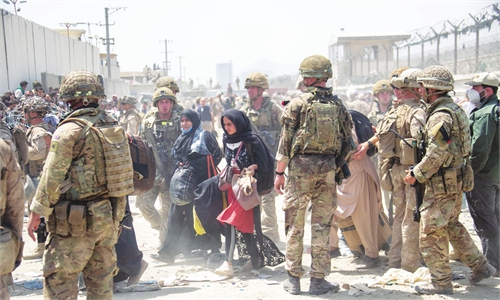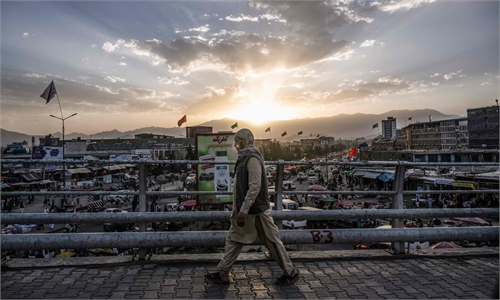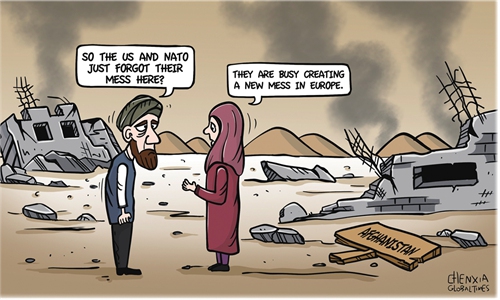IN-DEPTH / IN-DEPTH
China’s poverty alleviation experience can help Afghanistan: ICRC special adviser
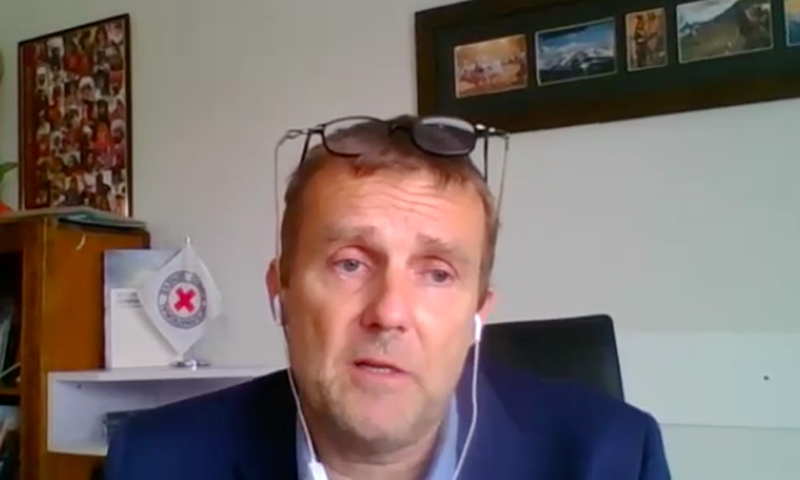
Reto Stocker, ICRC special adviser in Kabul Photo: Xie Wenting/GT
Editor's Note: A year has passed since the Taliban entered Kabul and took power in Afghanistan, drawing global attention to its governing style. What has happened to the Afghan people under Taliban rule? What has changed and not changed about the Taliban government compared with 20 years ago? What's the biggest humanitarian crisis the country faces? Global Times reporters Xie Wenting and Bai Yunyi (GT) discussed these topics with Reto Stocker (Stocker), International Committee of the Red Cross (ICRC) special adviser in Kabul.
GT: What's the biggest humanitarian crisis facing the country at this moment?
Stocker: Indeed, there is a very large humanitarian crisis in a country where living has never been easy. Afghanistan has a very harsh climate, a lot of mountains, and even without the last 45 years of conflict, life has been very challenging. This is a chronic reality in Afghanistan. On top of it, there was the fall of the former government. Fortunately, it was with less violence than expected, which spared people from the kind of prolonged war that we saw in the 1980s and 1990s.
But something else happened, which was a shift in the international community and in particular, the West. The West was once very generous in security support as well as development support for Afghanistan, making up probably about three quarters of the budget that was available for the nation. But this has ceased, almost completely out of political considerations. This has come as a huge shock to people across society for different reasons.
If you have financial systems that are no longer working, your economy is fundamentally challenged. There are probably only a few people who have not been dramatically affected by what has happened since August last year.
Not everything is bleak. Security has improved. Rural areas that had been cut off because it was too dangerous and too expensive for poor people to travel can now get access to advanced health services in urban areas. But at the same time, many Afghans are in despair about their economic situation. Besides, there is a continued absence of secondary education for girls, in particular, and the roles for women in society are shrinking dramatically. There has also been an increase in malnutrition.
We have to find solutions. Some of this is visible, some of it is not visible. But I think what the ICRC fears and the fear of large parts of the Afghan population is that a humanitarian solution is not good enough and that more is needed. Afghans deserve better than prolonged humanitarian assistance.
GT: What experience has touched you the most during your work in Afghanistan over the past year?
Stocker: One thing that really struck me was in our efforts to support the health sector. In October, we started getting these calls for help from the ministry of health and from individual hospitals. When we started visiting those hospitals in and out of Kabul, we did not really know what to expect. Salary payments for staff in some hospitals had already stopped in April 2021 because the war effort sucked up so many resources. So we were facing doctors and nurses, both male and female, telling us in October that they hadn't been paid for the last four or five months. This meant many of them were walking for an hour or two hours to work in the morning. There were also limited supplies in hospitals. There were no drugs, but patients were still there. The health sector was collapsing and a brain drain of the well-trained elite of the country was happening.
We saw these heartbreaking situations where nurses and doctors tried to gather some resources to buy some food for the most vulnerable patients. At the same time, in the evening they had to walk back home, often not knowing how to feed their own families. I think that's really part of the tragedy of what is happening in Afghanistan today.
These are people who had regular lives, a good, steady income, and expectations but suddenly did not know how to get food on the table for their own families while continuing to work. They have a sense of responsibility for the hospital that they're working in. We felt there was a very strong professional pride in their medical role. We really felt this was a very difficult situation and thought investing into it might work.
These people who have skills, dedication and convictions gave us the courage to do something that at that time nobody else there was doing, which was going to the ministry of health to devise jointly a memorandum of understanding at that stage. This was for early October, supporting 15 large hospitals in terms of salary payments and costs such as drugs and consumables.
We thought we had made the right decision. We felt that donors and political actors - some of whom were initially very concerned and felt the ICRC was moving too close to the government - actually realized that we did one critical thing. This was financially isolating this program, so money would not go through the ministry of health or the ministry of finance, but the ICRC would directly provide money to the staff individually every month in cash.
We're also encouraged by the initial successes to go further in extending the program to more hospitals. Today, some organizations have moved into parallel assistance, trying to stay away from government, and they have their rationales and pressure from donors, as well as political considerations. We have a strong conviction that governments are needed and have very essential roles that cannot just be bypassed in parallel systems by other organizations. We had to find innovative ways of dealing with the challenges. We can use governmental systems, but while having our programs financially insulated.
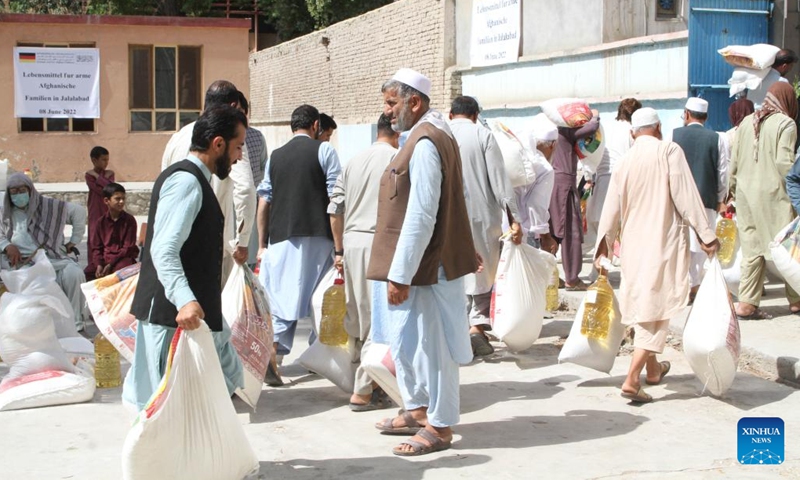
People receive food assistance in Nangarhar province, Afghanistan, June 8, 2022. A total of 2,086 families have received food assistance in four Afghan provinces, the Office of the State Minister for Disaster Management and Humanitarian Affairs said on Tuesday.(Photo: Xinhua)
GT: How do you assess the communication and cooperation between the ICRC and the Taliban government? Based on your personal experiences and observation over the past year, do you think the Taliban has become more mature compared with 20 years ago?
Stocker: I have personally a pretty long history in the region and in Afghanistan. I worked there in the late 1990s when the Taliban were in control. Let's call this Taliban Islamic Emirates of Afghanistan 1.0. I think engagement is the thing that is really crucial to success in Afghanistan.
The ICRC is an organization that is mandated to work in conflict situations and is neutral, independent and impartial. We worked with the Taliban government in the late 1990s. We were again in contact with the Taliban as soon as they started challenging the new government as early as in 2003 and 2004, and had a strong working relationship with them as an armed opposition, as we are having it in other contexts as well.
I used to sit with Taliban commanders, Taliban provincial and regional governors and the likes in the late 1990s on the floor. The government at that time was essentially exporting scrap metal from old Russian factories that were dilapidated. There was also a bit of fruit, and vegetables in small quantities. The imports were mainly oil, sugar and tea. I'm exaggerating a bit, but only a little bit.
This has become a very different country. And the same Taliban 2.0 government today oversees a very complex economic landscape with massive border revenue collection. It is using, for the first time, a national budget that is exclusively generated with its own means.
So there are good things that are happening. And we clearly see its administrative capacity is much more advanced than in the late 1990s. In a world that has become more complicated and connected, I think that's also a very important issue.
I think that the new government today also sees what role Afghanistan can play. I see a government that is aiming at wider relationships in the region and is making best use of Afghanistan's economic potential, which will benefit peace. This is something that China, in particular, understands better than anybody else. You have the kind of networks that rely on local and regional peace and stability. And I really hope that this will become a driving force for a better Afghanistan in the future.
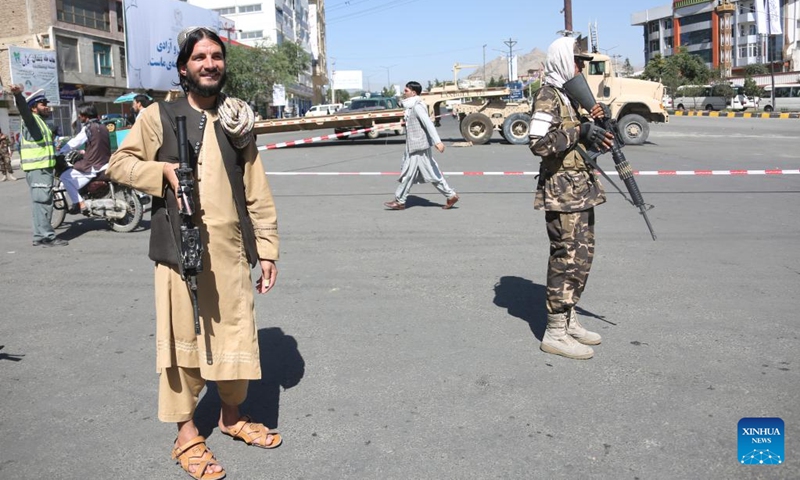
Taliban members stand guard near the conference venue of the Loya Jirga in Kabul, Afghanistan, June 30, 2022. The much-awaited Loya Jirga or grand assembly of religious scholars and elders opened in Afghanistan's capital Kabul on Thursday, the Afghan caretaker government's chief spokesman Zabihullah Mujahid said.(Photo: Xinhua)
GT: What do you think has not changed about the Taliban?
Stocker: I have shared both personal as well as institutional views on the draconian changes that have happened when it comes to girls. Their ambition for good education, a perspective for themselves as dignified professionals in the economy and society has been affected. Talking about the restrictions for women in terms of social movement, in terms of business opportunities, the World Bank has published what I think is very credible data showing that the shrinking economy since August last year has disproportionately affected the female workforce, and female workers find it even more difficult to cope than their male counterparts.
So this is really something which for me as a representative of a humanitarian organization is not acceptable and we have an obligation to find the culturally appropriate, diplomatically appropriate way of advocating on behalf of those people. Now we can always alleviate their suffering. We have programs where we provide cash to 10,000 female-headed households. That's simple humanitarian assistance. But we are really downgrading their expectations massively. And I think this is something that we will always have to stand up for, in the hope that those same women can still have economic opportunities.
I mentioned before there was an earthquake. In that tragedy, there was a call for female medical staff that gave me a lot of hope. I think it is these voices that need to be heard more and the government needs to reflect on the consequences of the absence of secondary education for girls in the medium to long term. I hope the change will come.
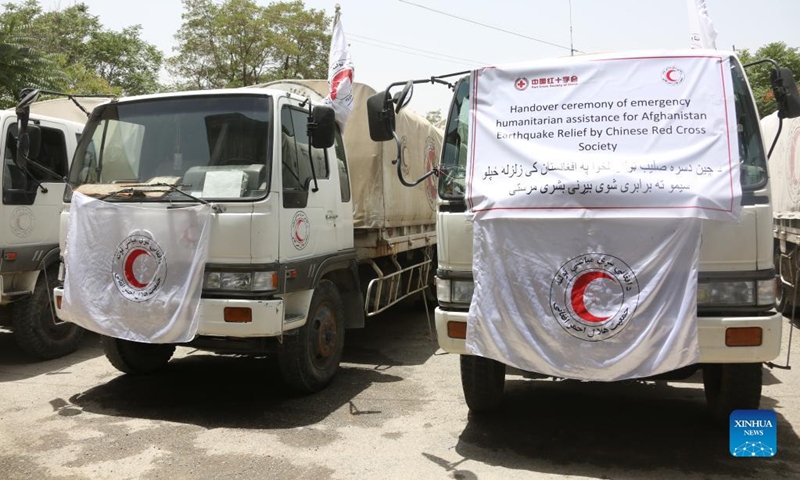
Photo taken on July 3, 2022 shows trucks carrying earthquake relief supplies donated by the Red Cross Society of China (RCSC) at a handover ceremony in Kabul, Afghanistan. The Afghan Red Crescent Society (ARCS) has received earthquake relief supplies donated by the RCSC.(Photo: Xinhua)
GT: How do you evaluate the help that China provides to Afghanistan?
Stocker: China is a long-standing friend of the Afghan nation and Afghan people. Since the 1990s, the ICRC has been working in the Mirwais hospital in Kandahar. We call it Mirwais hospital, but a large part of the Kandahar population actually calls it the China hospital. This is because it was Chinese assistance and engineering that created it in the 1970s. I think these kind of long-lasting relations are really at the very opposite end of the current humanitarian approach.
Even what some development actors have done and can do is not enough for countries like Afghanistan. We need long, lasting relationships in and outside Afghanistan at the government level as well as at the non-government level. The Jamhuriat hospital in Kabul is another very modern and large hospital that has been funded and supported by China. I would encourage China to find ways to continue this kind of support.
I learned from the Chinese ambassador in Kabul, whom I have met repeatedly over the last few months, that China has started the economic chain whereby high value products that got stuck inside Afghanistan were transported into the market in China. Chinese people felt that by buying a little bag of seeds, they were making a personal contribution. The government put the system in place. And what I really liked coming back to what the ambassador told me is the concept that they are teaching people how to fish. I think this is very important. Afghans don't want to be beggars, they would like to have a dignified life. They are very hard workers. I think China with its experience of having lifted hundreds of millions of people out of poverty, has the experience to help the nascent Afghan government with a similar process. A large part of the Afghan population today is below the poverty line and needs to be lifted above it. Humanitarian interventions will not do it. It is very heartening to see that China can rapidly decide to deliver goods, blankets, food and tents after the earthquake.
I strongly advocate for countries with a leading role toward Afghanistan like China to push further and realize that the longer a total absence of development interventions last, the more chronic the problems will get.
